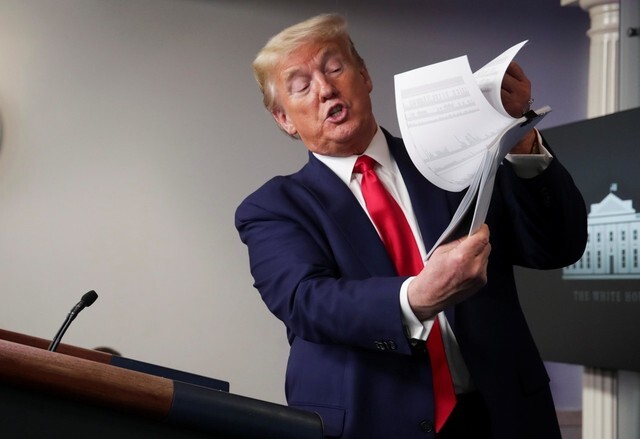hankyoreh
Links to other country sites 다른 나라 사이트 링크
Trump rejects S. Korea’s offer for cost-sharing negotiations

US President Donald Trump said he’d rejected an offer made by South Korea in its ongoing negotiations with the US over their defense cost-sharing agreement and pressured Seoul to contribute a larger share. Negotiators from the two sides haven’t even scheduled the next round of talks, suggesting that it will be some time before the final deal is struck.
“They’ve offered us a certain amount of money, and I have rejected it. I just said [. . .] ‘Look you know, we’re doing a tremendous service,’” Trump said when asked about the negotiations for the 11th Special Measures Agreement (SMA) during the briefing of his coronavirus task force at the White House on the afternoon of Apr. 20.
Through these comments, Trump officially acknowledged that he’d intervened to prevent a deal from being reached in the cost-sharing negotiations, rejecting a tentative agreement that had been reached by the working-level negotiators. Reuters had previously reported that Trump had turned down an offer by South Korea to increase its cost-sharing contribution by at least 13% from the previous year.
“South Korea is a very wealthy nation. They make our television sets. They make ships. They make everything,” Trump said. “We’re asking them to pay for a big percentage of what we’re doing.”
Trump said that South Korea is currently paying US$1 billion a year, adding that he’d told the South Koreans, ‘Look, I’ll be back because that’s just a fraction.’” Last year, South Korea paid 1.04 trillion won (US$841.2 million) toward the cost of stationing US troops on the Korean Peninsula.
However, Trump dismissed the reports made by some media outlets suggesting that the US is looking into scenarios for reducing the American troop presence in South Korea in connection with the cost-sharing negotiations. “It’s not a question of reduction; it’s a question of will they contribute toward the defense of their own nation,” Trump said.
With Trump taking such a hard line in the cost-sharing negotiations, some experts think it’s unlikely that a breakthrough will be reached any time soon. “The cost-sharing negotiations have basically been concluded at the level of the government delegations. It’s unprecedented for the US president to take such an interest in the cost-sharing negotiations and to personally meddle in them as he’s been doing,” a South Korean government official said.
No future negotiations scheduled yetThe two sides haven’t scheduled any additional meetings since the seventh round of negotiations ended last month. “We haven’t reached the stage of suggesting more negotiations. I think we’ll have to look for the right opportunity as we maintain communication,” said a senior official from South Korea’s Ministry of Foreign Affairs.
“Since we’re fully aware of our respective positions, this is the stage where we have to keep narrowing that gap,” another official stressed. The two teams are maintaining minimal communication on email and over the phone. Given the circumstances, there are concerns that the breakdown in the negotiations could last through the summer and all the way to the US presidential election in November.
With no deal forthcoming in the negotiations, some 4,000 South Korean employees of US Forces Korea (USFK) were put on unpaid leave on Apr. 1, and the South Korean government is currently moving to pass a special act that would allocate them support from the national budget.
“It’s too bad that a deal keeps getting delayed. A special act needs to be passed to address the fact that Koreans employed by USFK are on unpaid leave and to strengthen our government’s bargaining position,” said Son Ji-o, secretary-general of the USFK Korean Employees Union.
By Hwang Joon-bum, Washington correspondent, and Kim So-youn, staff reporter
Please direct comments or questions to [english@hani.co.kr]

Editorial・opinion
![[Column] Park Geun-hye déjà vu in Yoon Suk-yeol [Column] Park Geun-hye déjà vu in Yoon Suk-yeol](https://flexible.img.hani.co.kr/flexible/normal/500/300/imgdb/original/2024/0424/651713945113788.jpg) [Column] Park Geun-hye déjà vu in Yoon Suk-yeol
[Column] Park Geun-hye déjà vu in Yoon Suk-yeol![[Editorial] New weight of N. Korea’s nuclear threats makes dialogue all the more urgent [Editorial] New weight of N. Korea’s nuclear threats makes dialogue all the more urgent](https://flexible.img.hani.co.kr/flexible/normal/500/300/imgdb/original/2024/0424/7317139454662664.jpg) [Editorial] New weight of N. Korea’s nuclear threats makes dialogue all the more urgent
[Editorial] New weight of N. Korea’s nuclear threats makes dialogue all the more urgent- [Guest essay] The real reason Korea’s new right wants to dub Rhee a founding father
- [Column] ‘Choson’: Is it time we start referring to N. Korea in its own terms?
- [Editorial] Japan’s rewriting of history with Korea has gone too far
- [Column] The president’s questionable capacity for dialogue
- [Column] Are chaebol firms just pizza pies for families to divvy up as they please?
- [Column] Has Korea, too, crossed the Rubicon on China?
- [Correspondent’s column] In Japan’s alliance with US, echoes of its past alliances with UK
- [Editorial] Does Yoon think the Korean public is wrong?
Most viewed articles
- 1‘We must say no’: Seoul defense chief on Korean, USFK involvement in hypothetical Taiwan crisis
- 2N. Korean delegation’s trip to Iran shows how Pyongyang is leveraging ties with Moscow
- 346% of cases of violence against women in Korea perpetrated by intimate partner, study finds
- 4Amnesty notes ‘erosion’ of freedom of expression in Korea in annual human rights report
- 5‘Weddingflation’ breaks the bank for Korean couples-to-be
- 6[Column] Park Geun-hye déjà vu in Yoon Suk-yeol
- 7Will NewJeans end up collateral damage in internal feud at K-pop juggernaut Hybe?
- 8Korea sees more deaths than births for 52nd consecutive month in February
- 9“Parental care contracts” increasingly common in South Korea
- 10[Interview] Dear Korean men, It’s OK to admit you’re not always strong